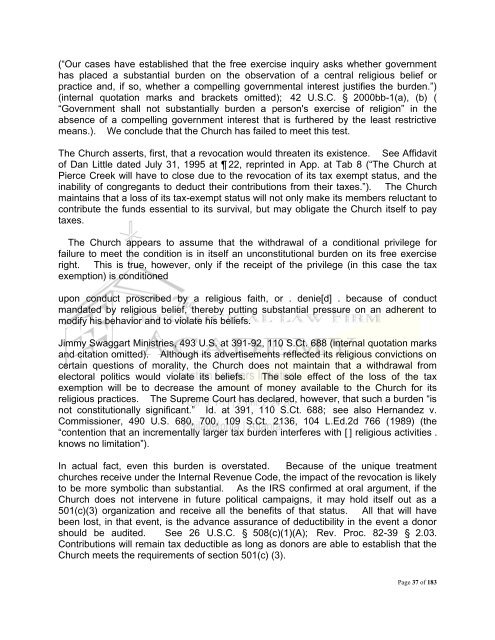The 508(c)(1)(a) Initiative Workshop
The 508(c)(1)(a) Initiative Workshop
The 508(c)(1)(a) Initiative Workshop
Create successful ePaper yourself
Turn your PDF publications into a flip-book with our unique Google optimized e-Paper software.
(“Our cases have established that the free exercise inquiry asks whether government<br />
has placed a substantial burden on the observation of a central religious belief or<br />
practice and, if so, whether a compelling governmental interest justifies the burden.”)<br />
(internal quotation marks and brackets omitted); 42 U.S.C. § 2000bb-1(a), (b) (<br />
“Government shall not substantially burden a person's exercise of religion” in the<br />
absence of a compelling government interest that is furthered by the least restrictive<br />
means.). We conclude that the Church has failed to meet this test.<br />
<strong>The</strong> Church asserts, first, that a revocation would threaten its existence. See Affidavit<br />
of Dan Little dated July 31, 1995 at 22, reprinted in App. at Tab 8 (“<strong>The</strong> Church at<br />
Pierce Creek will have to close due to the revocation of its tax exempt status, and the<br />
inability of congregants to deduct their contributions from their taxes.”). <strong>The</strong> Church<br />
maintains that a loss of its tax-exempt status will not only make its members reluctant to<br />
contribute the funds essential to its survival, but may obligate the Church itself to pay<br />
taxes.<br />
<strong>The</strong> Church appears to assume that the withdrawal of a conditional privilege for<br />
failure to meet the condition is in itself an unconstitutional burden on its free exercise<br />
right. This is true, however, only if the receipt of the privilege (in this case the tax<br />
exemption) is conditioned<br />
upon conduct proscribed by a religious faith, or ․ denie[d] ․ because of conduct<br />
mandated by religious belief, thereby putting substantial pressure on an adherent to<br />
modify his behavior and to violate his beliefs.<br />
Jimmy Swaggart Ministries, 493 U.S. at 391-92, 110 S.Ct. 688 (internal quotation marks<br />
and citation omitted). Although its advertisements reflected its religious convictions on<br />
certain questions of morality, the Church does not maintain that a withdrawal from<br />
electoral politics would violate its beliefs. <strong>The</strong> sole effect of the loss of the tax<br />
exemption will be to decrease the amount of money available to the Church for its<br />
religious practices. <strong>The</strong> Supreme Court has declared, however, that such a burden “is<br />
not constitutionally significant.” Id. at 391, 110 S.Ct. 688; see also Hernandez v.<br />
Commissioner, 490 U.S. 680, 700, 109 S.Ct. 2136, 104 L.Ed.2d 766 (1989) (the<br />
“contention that an incrementally larger tax burden interferes with [ ] religious activities ․<br />
knows no limitation”).<br />
In actual fact, even this burden is overstated. Because of the unique treatment<br />
churches receive under the Internal Revenue Code, the impact of the revocation is likely<br />
to be more symbolic than substantial. As the IRS confirmed at oral argument, if the<br />
Church does not intervene in future political campaigns, it may hold itself out as a<br />
501(c)(3) organization and receive all the benefits of that status. All that will have<br />
been lost, in that event, is the advance assurance of deductibility in the event a donor<br />
should be audited. See 26 U.S.C. § <strong>508</strong>(c)(1)(A); Rev. Proc. 82-39 § 2.03.<br />
Contributions will remain tax deductible as long as donors are able to establish that the<br />
Church meets the requirements of section 501(c) (3).<br />
Page 37 of 183
















